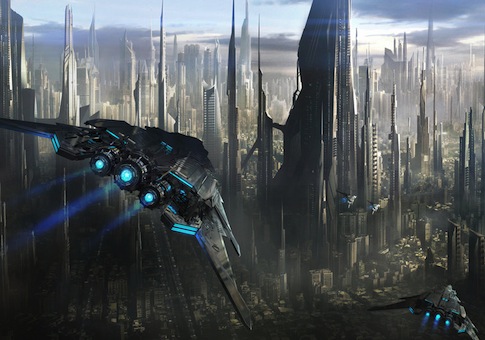In 2011, Peter Thiel, co-founder of PayPal and Palantir Technologies, worried that the future might be over.
In a cover story for National Review, the entrepreneur and investor argued that, "when tracked against the admittedly lofty hopes of the 1950s and 1960s, technological progress has fallen short in many domains." Only drastic changes, he said, could sustain the centuries-long (and historically atypical) stream of progress that the rise of the West has represented.
To this end, Thiel has published Zero to One. It expands upon Thiel’s National Review piece, but draws more directly from the notes of Blake Masters, his student at Stanford University. Thiel’s thesis is a call to action: "Doing what we already know how to do takes the world from 1 to n, adding more of something familiar … but every time we create something knew, we go from 0 to 1." Such innovation is, to Thiel, the source of all progress.
His book is a breezy, quick read, full of visuals and references that mostly enhance Thiel’s argument rather than distract. In the book’s second half, devoted to "Notes on Startups," Thiel is at his best. Drawing from his own venture capital, entrepreneurship, and start-up successes—such as being Facebook’s first outside investor—he provides helpful advice for aspiring businessmen.
Even though Thiel stresses that he provides no company-specific answers, would-be start-up founders will profit from his advice on the importance of a dedicated founder, a promising idea, and a founding team that collaborates well, as well as from his wisdom on equity and sales. Nor should they reject Thiel’s unorthodox belief that, because they abound in the aforementioned qualities, "the best startups might be considered slightly less extreme kinds of cults."
But Thiel’s unorthodoxy sometimes fails to convince. His contention that "competition and capitalism are opposites" stands out as questionable. To him, businesses only have consequential success to the extent that they offer something no one else can: "The history of progress is a history of better monopoly businesses replacing incumbents."
To reach this conclusion, Thiel rejects out of hand the benefits that decades of economic literature have assigned to competitive markets. He also derides competition. If forced to compete, Thiel writes, "either you don’t throw any punches, or strike hard and end it quickly." What if it doesn’t end quickly?
And even if, to Thiel, progress comes from new monopolies replacing incumbents, certain incumbents are apparently immortal. Twitter lacks an "inherent reason why it should ever stop growing"; a new firm could never bury Google as it buried its past competitors. In short, competition is irrelevant. The future alone matters.
Yet for a book about the future, Thiel is coyly vague about what he thinks it holds. He gives glimpses throughout, and then merely categorizes his vagueness in terms of progress—roughly: cyclical, plateauing, catastrophic, and utopic—and indicates his preference (the last one). He is more comfortable explaining past mistakes with hindsight. But between scattered utopian calls for underwater cities, space colonization, and universal panaceas, and offhand comments about the prominence of Silicon Valley in the new economy, one gets a measure of Thiel’s desired future: a world refashioned in the Valley’s image, bestrode by its giants and by those who have adopted its mores.
But the world beyond the valley remains different from what lies within. This is why some of Zero to One makes sense, while the rest seems so artificially unconventional. Thiel’s book may provide practical counsel for other innovators in and out of the Valley, but his contrived edginess masks his tacit agreement with other Silicon Valley supremacists who, as the Weekly Standard’s Charlotte Allen detailed in "Silicon Chasm," will likely profit in this future at others’ expense. Anybody uncomfortable with a silicon world ought to be wary not just of Thiel’s worldview, but also of the future he wants to realize.
